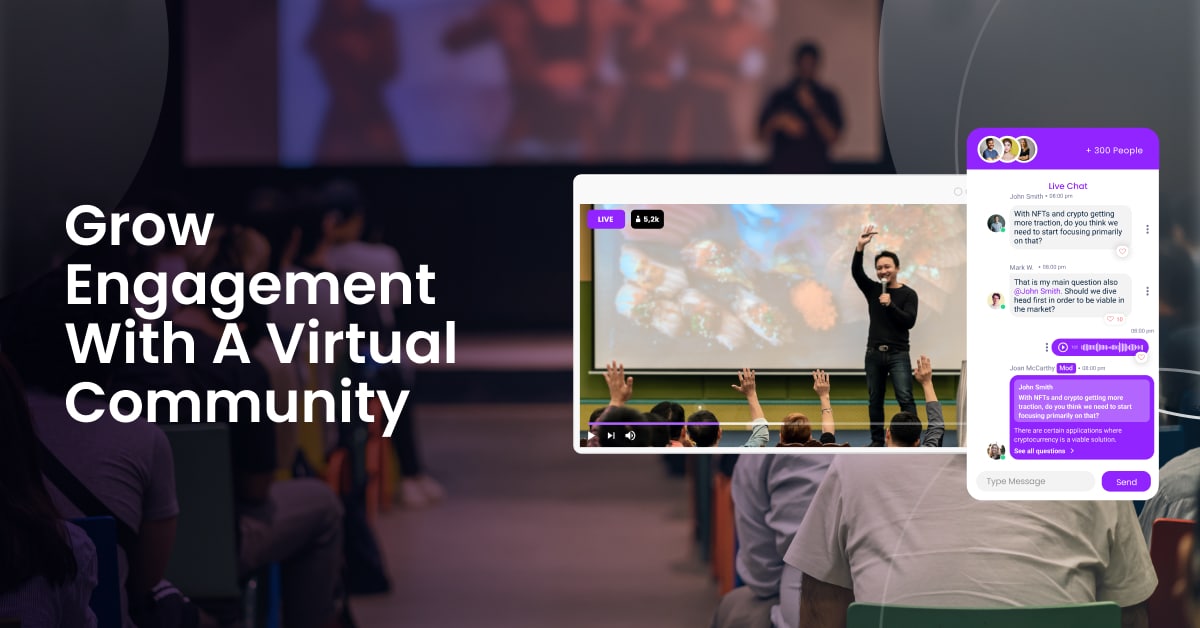Building a virtual community is a powerful way to have a positive impact. Online communities have tremendous flexibility in terms of time and participation. Yet many organizations miss opportunities to enrich their live events with an online community platform.
What Is A Virtual Community?
There are various ways to define a virtual community. Some researchers focus on questions of social identity, but our definition is more straightforward: a virtual community is a group of people who communicate digitally around a shared interest.
For example, there is a thriving virtual community in many parts of the technology industry. If you want to ask questions and get advice about Microsoft, Salesforce, and other platforms, there is an online community for those interests. Many virtual communities are also dedicated to sports, movies, TV shows and hobbies.

For publishers and companies, starting or growing a virtual community or even a series of online communities has significant attractions.
The Pros and Cons of A Virtual Community
Starting and growing a virtual community has multiple benefits for your community members and the event organizer. Here are some of the essential benefits to keep in mind.
Pros of Having a Virtual Community
Establishing a virtual community for your audience offers significant benefits, including making it easy to find warm leads.
- Get More Leads
Thriving online communities related to your company are a ready source of potential leads. With the right approach, your community may act as a sounding board for new product ideas and as early adopters. While that is an exciting benefit, your virtual community has to offer your community members appealing benefits, or you will lose people over time.
- Increase Engagement
For some organizations, like online media companies, growing audience engagement is their top goal. For publishers seeking to maintain or grow their paid subscriber base, offering a virtual community goes a long way toward achieving those goals. Online community growth becomes more manageable when your audience responds to new posts, announcements, and more. A more engaged audience is more likely to purchase and engage with advertising.
- Differentiate Your Brand
You’ve probably spent considerable time and effort creating a distinct and memorable brand. Yet few people outside the company likely understand your brand promise as profoundly as you might hope. Most potential customers are thinking about their families, needs, and problems – your brand probably doesn’t come to mind too often.
That’s where offering a compelling virtual community makes a positive impact. When people associate your brand with a community of friends who share their interests, your brand will become more appealing. Over time, a strong community can translate into significant brand loyalty and a greater willingness to accept premium prices.
- Improve Mental Health
Seeing mental health on this list might surprise you because it may not be one of your goals. However, giving people access to a solid online community where they can connect with others who share their interests matters. Developing a positive and inclusive virtual community may help people reduce anxiety and the impact of other problems like loneliness.
That said, a thriving online community hub is not the same thing as treatment. But every bit of positive human connection your community offers can help people get through a rough time.
Cons of Having an Online Community
While there is much to be said about running a virtual community, there are some disadvantages to keep in mind.
- Virtual Community Is A Long-Term Strategy
Developing a thriving virtual community will yield results, but these results often take years to yield fruit. In that sense, a running virtual community tends to produce better results when running alongside other marketing strategies. That said, there is a shortcut to building a virtual community faster, which we will reveal in the next section.
- A Virtual Community Requires Leadership and Content
Most thriving online communities revolve around leaders and content. For many small businesses, the founder may act as the leader, content creator, and community facilitator. In a larger organization, these roles can be shared among several people. In the long term, it is sometimes possible to recruit members of your community as well.
In the beginning, expect to invest considerable sweat equity in your virtual community. A successful content strategy is vital to making the community attractive. Without an appealing content strategy, it will be hard to see the value of your community. When the community is small, take the time to interact with each new member who signs up.
- A Virtual Community Requires The Right Technology
Setting up the technology needed to launch a digital community may feel daunting. At a minimum, a virtual community needs message board capabilities so that people can post messages and receive a community response. While useful, a message board is probably not enough to make your virtual community appealing. Instead, take inspiration from thriving online communities (e.g., the gaming community), which include video chat, live chat, and virtual events.
One Shortcut To Jump Start Your Virtual Community
Developing a thriving virtual community takes time, but there is one way to accelerate the process: events. Specifically, running a virtual or hybrid event can help ignite your community’s growth. Unlike a simple online message board, events are different.
In contrast to an always-available online group, an event is a limited and scarce experience. Since the event occurs at a specific time and place, there is a real sense of scarcity. That scarcity helps to make the event more valuable. Furthermore, a virtual event that uses a proven process, like our virtual event checklist, is well organized and tends to offer relevant content to participants.
How To Bridge The Gap Between Virtual And Real Communities
The value of connecting a virtual community and a traditional community is all about finding the best of both worlds. Let’s look at a few examples in both the corporate and educational settings that illustrate the power of these events.
Specifically, adding live chat to your online events makes a tremendous difference in bringing your community together. With live chat, you can get feedback from your peers, answer questions and build connections.

Bringing Together In Persona And Virtual Communities For Companies
The booming popularity of remote and hybrid work arrangements has delivered considerable benefits. Flexible schedules and greater work-life balance are precious. Yet the lack of real-time interaction over coffee or lunch can make it more difficult to form strong relationships. The critical technology to enable these virtual communities is implementing a live chat, because it makes it easy and simple to share comments, questions and more.
To enrich your community, start with these virtual community and virtual event ideas.
Annual Company Conference
Many companies run annual conferences to connect with their customers, recognize top performers and announce important events. Adding a virtual community to this type of corporate event helps in several ways. First, you can accommodate more participants, including those who might be unable to travel to the event in person. Second, you can extend the conference experience before and after the official conference date. For example, you might launch “teaser videos” about the conference keynote speakers in advance to spark greater excitement.
Sales Kick Off
Supporting the company sales team is a critical leadership responsibility. Success in sales requires perseverance in the face of pressure, disappointment, and stress. Offering encouragement, relevant training, and other resources in a sales kick-off event can help the sales team to thrive.
Enriching your sales kick-off event with a virtual community helps deepen the event’s value. For example, you might invite a sales expert like Jeb Blount about one of his books, “Fanatical Prospecting” or “Selling The Price Increase.” To support your team in applying the lessons of the book covered in the keynote, set up a virtual community where people can come together to share their wins, questions, and other comments weekly.
Recruitment Events
Attracting high-quality graduates and employees to work for your organization is becoming more difficult in many countries. As of July 2022, the US Bureau of Labor Statistics reported that US unemployment has fallen to 3.5%. In other words, many workers have choices. New methods like recruitment strategies are needed for employers seeking to compete for the best talent.
Enhancing recruitment with a virtual community starts with taking a long-term view of talent. Instead of engaging students when they are a few months away from graduation, start earlier. This might take the form of establishing a virtual community for your summer internship program. Give your current and prospective employees a chance to interact with your current staff, ask questions and find out why they should consider working with you.
By the way, you don’t have to restrict yourself to cultivating graduates and younger professionals only. For inspiration, look at the virtual communities that the world’s leading consulting firms have long cultivated. PwC, a global leader in accounting and consulting, runs a US alumni program that offers on-demand learning to help alumni succeed, networking opportunities, and career opportunities for former employees.
Fostering Higher Education Using Virtual Communities
For colleges and universities, virtual communities can make an even greater impact. The following introduces a few opportunities. For a comprehensive guide to virtual event ideas in higher education, see our post: 60 Awesome University Virtual Events Ideas. Organizing a virtual event series is a powerful way to grow your virtual community.

Just make sure that you include live chat so that your students, alumni and other community members can easily participate – not everybody likes to appear on video after all.
College Orientation
Many colleges and universities have reported lower enrollment numbers over the past few years. The pandemic, high costs and the growth of alternative online learning opportunities have some questioning the value of traditional post-secondary education.
Offering a robust college orientation experience is one way that campus leaders reach out to their students. In addition to traditional orientation activities and parties, look for ways to build a virtual community that starts before students arrive on campus.
The assigned reading of new books includes memoirs, novels, essays and other works. For example, the University of Delaware assigned “While the Earth Sleeps We Travel: Stories, Poetry, and Art from Young Refugees Around the World” by Ahmed M. Badr. Meanwhile, Siena College has assigned the Pulitzer Prize winning novel “The Nickel Boys” to new students. Giving students a book to read before they arrive on campus gives them a tangible connection to campus long before they show up in person.
These reading recommendations help to give students common ground with their peers and to start their learning journey. Why not invite students to join a virtual community where they can discuss the book and raise other questions before they arrive on campus?
College Career Fair
After paying thousands of dollars in fees, many students are hungry to discover their career opportunities. Traditional career fair events offer invaluable networking opportunities. These events are not accessible to all students, especially those with significant family or work commitments. Asking a student to give up a paying shift to attend an event may not be realistic in some cases.
Offering a virtual community to support college career events makes a big difference. For instance, you can invite students to join sub-groups focused on exploring certain professions like accounting, nursing, nonprofits, or engineering. By giving students more time and space to come up with questions and seek support, students are more likely to discover various career paths.
Alumni Organization
Once students leave campus, that doesn’t mean they have left the college community. Many colleges have long-established alumni associations that organize events, networking databases, and other resources. Keeping alumni engaged with valuable insights and opportunities means your alumni are more likely to be open to making donations and volunteering. Just think about the opposite case – what if you only heard from your college alumni association when they had a donation campaign? It might feel like a one-way relationship, and such relationships tend not to last long.
What if you’re not sure what to offer your alumni? Take inspiration from the McMaster University Alumni Association. In 2020, they solicited feedback from their alumni and received dozens of suggestions, including requests for online events. Many of these suggestions could be integrated into a virtual community format. For instance, one alumnus requested computer skill training for older people curious about digital technology.
Get Started Building Your Virtual Community
Starting a virtual community is an exciting journey, but it’s not one you should take alone. Find out about Arena’s Social & Communities page for more information on how we can help you grow faster.



